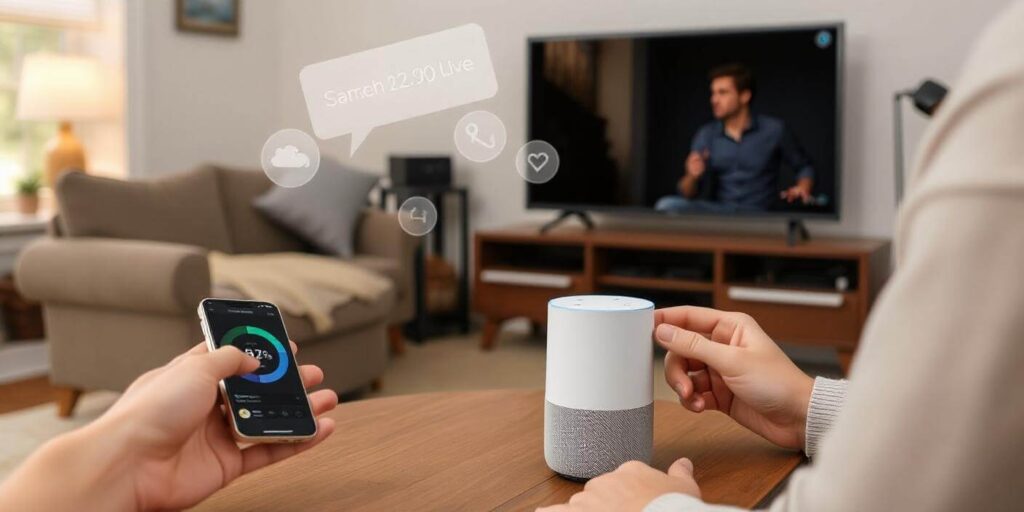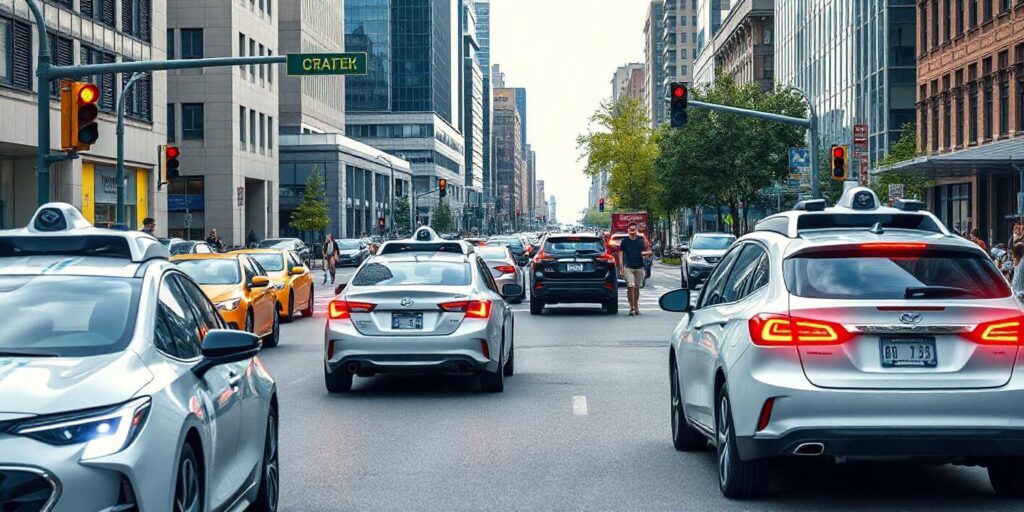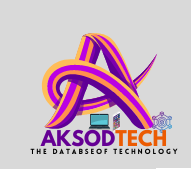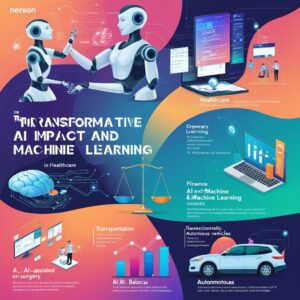Artificial intelligence, often known as AI, may seem outlandish and fictional, but it has truly grown to become a huge part of our everyday lives. AI is becoming a part of a general view of life, be it job execution or leisure time. From the time we wake up in the morning, AI gets in the picture, and from every nook and cranny, even silently, it finds a way to support us in doing things easier, smoother, and at times a little spooky.
But what is AI, really, and how is it affecting our lives? That’s the crux of many different manifestations AI is taking in our world, quite a few of them in ways we aren’t even aware of. If you care to find out, read on, though, as by the end, you’ll have a better understanding of how AI is changing our lives and what it means for the future.
What is Artificial Intelligence?
So, before we go into all the possible small-deal details of AI’s impact, let me now brief you more on AI. In other words, it can be defined as the simulation of human intelligence in computers or machines. It includes lots of things: the ability to learn from experience, recognizing patterns, understanding language, and making decisions. Consider it to be a model for the computer of an individual’s brain, even if it is not nearly as complex in itself.
AI in technology is a long-standing phenomenon, but its rise to success culminated in the last couple of years owing to technological progress. Today, AI is wiser, quicker, and more integrated into our lives than ever before. From voice assistants like Siri and Alexa to more complex systems that can actually analyze immense amounts of data in seconds, AI is used in every tech today.

AI in Everyday Technology
Robots and high – tech gizmos might come to your mind when you hear AI, but it’s reality: AI is already living in everyday technology .
- AI in Smartphones: Let’s start with something most of us can’t do without these days: our smartphones. If you’ve ever made a reminder for yourself using Siri or gotten turn-by-turn directions from Google Assistant, you’ve used AI. You probably didn’t even realize you were doing it, but these virtual assistants learn voice commands from you in real time, search the internet, and even fine-tune their results for you over time.
And that’s not all. AI also operates the facial recognition software that unlocks your phone and the predictive text that completes your sentences when you’re typing a message. Even the photos you take are many times enhanced by AI, which can, on its own, adjust the lighting and delete the red-eye effect.
- AI in Home Assistants: Another example deals with assistants: home devices are now marketed by companies like Amazon Echo and Google Home with embedded AI. Smart speakers can play music and manage home device controls, in addition to answering questions and telling jokes. Their AI is through regular learning by interaction, becoming better at understanding you and your needs. Surely, AI is in play when you scroll over all these platforms. Facebook, Instagram, and Twitter personalize your feed: they show you content they think will appeal to you according to your actions. It’s under these features where AI works in seeking out and filtering malicious content, making your online experience safe and enjoyable.
- AI in Streaming Services: Consider Netflix, for example. Have you ever thought about how it would be if you knew exactly what you wanted next? Well, that’s nothing but artificial intelligence. Netflix uses AI algorithms to look at what you have watched in the past and makes recommendations about shows and movies that you may find interesting. The more you watch, the better it gets at suggesting content. Spotify does for the music space. Recommendations by its AI can bring exposure to new artists and tracks that fit your taste, creating an experience of personalization that’s hard to beat.
- AI in E-commerce: One of the key areas in which AI has been applied is in online shopping. Websites such as Amazon use AI to suggest products to you by looking at your browsing behavior, past purchase history, and other techniques to understand what other customers who have these same techniques also bought. This will eventually translate to a much better buying experience and finding more products.

AI and the World of Work
- AI and Productivity Tools: The pace at which AI is quickly becoming a sine qua non in the office, from the automation of simple routines to enabling data analysis, is simply amazing. Microsoft Office tools and Google Workspace are examples of office tools that have AI features, which help you in making improvements in writing emails, prioritizing your schedule, and even forecasting simple data that will trend. This way, you are able to focus on more productive and important matters.
- AI in Customer Service: Ever chatted with a customer service bot? That’s AI at work. More and more companies are using AI-based chatbots nowadays to respond to customer inquiries. These bots answer questions, process orders, and solve problems around the clock, serving both the customer’s needs and enhancing satisfaction while freeing up human employees to focus on tougher stuff.
- AI in Recruitment and HR: On the flip side, AI has radically changed how companies hire and manage their workers. Resumes can be screened, candidates evaluated, and even first-round interviews done with the use of AI implementations in recruitment. It can process and analyze employee data to identify patterns, predict turnover, and provide a recommendation for workplace satisfaction improvement.

AI in Healthcare
- AI in Treatment and Diagnostics: AI is changing the way to seek treatment and diagnosis of diseases for doctors treating a patient. For instance, using medical imaging, like an X-ray or an MRI, AI can detect cancers much earlier without losing precision—a great thing. In some cases, AI has often raised flags even on the treatment and has a similar suggestion to give, cutting to the latest in research and data, which helps doctors make better-informed judgments.
- AI in Wearable Health Devices: Wearable technology—smartwatches and fitness trackers—are also reaping the benefits of AI. It works in the sense that smartwatches detect your usual heart rate, your sleep cycles, and even identify irregularities that may indicate a health issue. So, lots of AI are at work in them, taking this data and making some kind of sense out of it to deliver recommendations on health and active living.
- AI in Mental Health Support: AI is also being applied to support mental health. Applications such as Woebot, which incorporate AI, deliver cognitive-behavioral therapy, providing users with a process to manage stress, anxiety, and depression. The AI-based tools may not replace human therapists, but they will definitely be there with you in the junction to offer support and resources whenever you need them the most.

AI in Transportation
- AI in Self-Driving Cars: One of the proposed applications is self-driving cars in transportation AI. Firms like Tesla are using AI for developing vehicles that are capable of traveling roads, avoiding obstacles, and even parking by themselves. Fully autonomous cars are still to reach the market, and the emerging technology behind AI already makes driving much safer and efficient.
- AI in Public Transport: It is also making public transportation smarter; for example, AI can be used to analyze traffic patterns and optimize bus routes so that the buses run on a shorter travel time cycle and provide better service. In a few cities, AI-powered systems are being used to manage traffic lights to reduce the traffic congestion and ease the commuting stress.
- AI in Logistics and Delivery Services: Well, you’ve got Artificial Intelligence to thank in case you’ve ever bought anything online and you got it way faster than you expected. Delivery companies are utilizing Artificial Intelligence to optimize routes and forecast delivery times and even manage their fleets hence making the process of deliveries faster, more reliable, and more efficient.
AI and Education

- AI in Online Learning Platforms: Today, in the context of this online learning spree, AI has found itself at the core of teachers’ as well as students’ tools. Coursera and Khan Academy are two AI-powered platforms that interact with students in a way that offers a personalized learning preference. Besides, whether you learn fast or want some chewing time, AI is ready to make the most out of your piece of education.
- AI in Personalized Education: AI is also providing support in traditional classrooms. Companies like Smart Sparrow and DreamBox use artificial intelligence to create personalized lesson plans for students that are specifically moulded to the learning style of each individual student. This allows teachers to concentrate their attention on highly relevant support and lets students work more at their own pace.
- AI in Student Support: More than that, though, AI is being used in ways that are support-based for students beyond personalized learning initiatives. A simple instance of this would be homework or exam preparation supported by an AI-powered tutoring system. During off-hours, AI chatbots supplement questions on school policies, deadlines, among others, easily cross-checked to help the student find quick answers.
AI in Entertainment

Now, when it comes to entertainment, AI is really stepping things up a notch in terms of excitement and creativity.
- AI in Gaming: It is quite something to repeat that video games have really come a long way with part of the credit going to AI. In today’s world, AI is used to craft more realistic and challenging opponents besides designing complicated game worlds. Not to be left out are the rare innovations where AI even writes unique stories. The likes of “The Sims” and “Red Dead Redemption” use AI to make their characters and environments become realistic, thus not only complementing the overall game but also providing a totally different experience. That is analogous to streaming services, whereby AI helps find you a perfect movie to watch; Netflix and Amazon Prime state that they run AI algorithms based on the study of users’ viewing habits to suggest films and shows one is likely to enjoy. This will make it much easier to find new and interesting things to watch, all without scrolling through something like hours of other options.
- Artificial Intelligence in Art and Creativity: AI will also crack into the creative arts: from composing music to the construction of works of visual art, it will go on to stretch the contours of creativity. For instance, newer AI programs, such as OpenAI’s DALL-E, produce original artwork on the basis of textual prompts, while others write music indistinguishable from human compositions. Though AI-generated art is still quite novelty art, it does open new opportunities for artists.
Ethical Concerns of AI

As incredible as AI is, it is not free of difficulties and ethical concerns.
- AI Privacy concerns: One of the most problematic issues pertaining to AI is privacy. Many at times, AI systems like robots require large sets of data for optimal performance, thus creating lots of questions to do with the collection, storage, and usage of this data. For instance, AI enabled devices like smart speakers have their inbuilt AI enabled hence can listen and record commands; around this issue, there have been problems about eavesdropping and data misuse.
- Bias in AI Algorithms: A big concern, in addition, is bias in AI algorithms; since AI learns from data, it can sometimes pick up and reinforce any biases. These can manifest in biased outcomes—for example, unfairly based hiring decisions or online shopping pricing strategies—where ensuring fairness and non-discriminatory functions is already a continuous issue among the developers and policymakers.
Job Displacement Due to AI
Finally, it has the question of job displacement. The fear is actually real in a scenario such that AI becomes sufficiently competent to replace human workers in an array of industries. While AI should create new jobs, it will also disrupt traditional industries, thus creating unimaginable economic and social upheaval.
The Future of AI
So, how will AI evolve into the future? While it’s impossible to predict exactly how AI will evolve, it’s clear that the technology will continue playing a major role in our lives.
Society Predictions for the Role of AI
Experts believe AI can be an integral part of our lives in whatever we do, making everything personalized and, of course, efficient: be it shopping, health, transport, or even to socialize. It may also be used to combat big global challenges, for example, that of climate change and disease.
How AI Might Evolve
There is, thus, tremendous expectation that AI systems will grow in capacity and sophistication in the near future. This might actually make applications that were never imagined, new sets of ethical and societal challenges to answer.
The Importance of Responsible AI Development
One thing is clear: as AI growth continues, it is very important that we develop and use the technology in a responsible way. This means making AI systems fair, transparent, and aligned with human values and being actively concerned with the potential risks and working to mitigate them.
Conclusion
AI is already a big part of our daily lives, and its influence is only going to grow. Artificial Intelligence is making our devices that much smarter and is transforming the industries; such changes had been whispered as part of the science fiction of the past. But with all these changes come new challenges and responsibilities. Thus, while adoption of the benefits due to AI, it is consequential to sustain an informed and critical discernment about the implications for our life domain. So the next time you ask Siri for help or are glued to the latest show on Netflix, you have AI to thank.
FAQs
1. What is AI, and how does it work?
AI stands for artificial intelligence, that is, the machine’s capability to imitate intelligent human behavior. It functions by the processing of heavy data, calculating some learnings out of the data to form decisions, recognize patterns, and solve problems.
2. How does AI alter jobs?
AI may create or complementarily create or destroy jobs. Although, on the one hand, it will replace people, on the other hand, AI is very likely to open jobs in the field of technologies, data analysis, or AI development.
3. Can AI hurt humans?
AI can be destructive if not developed or used responsibly. The questions of data privacy, bias, and job displacement are among the challenges to be solved to bring AI for everything.
4. How is AI used in healthcare?
AI has been used to make improvements in the healthcare sector, where it can support in diagnosis, personalization of treatment plans, and even mental health. AI can be utilized in analyzing medical data, monitoring health condition, and even assisting with surgeries.
5. What do we expect from AI in the future?
In the future, almost inevitably, AI will come to be even more sophisticated and integrated widely into a large number of aspects of our lives. We can expect smarter devices, more personalization in services, and AI-driven solutions to global challenges.



